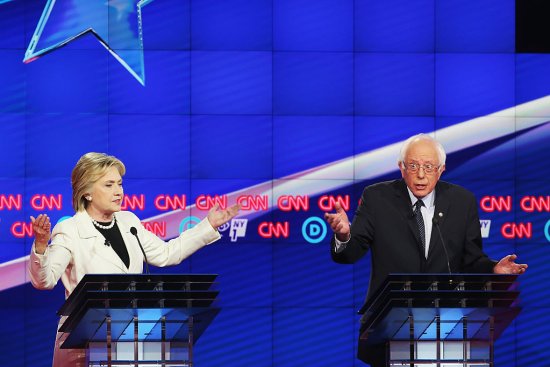
The President shares many policy positions with Clinton, but the mood at Sanders rallies surely reminds him of 2008
Barack Obama knows that the fate of his Presidential legacy will depend in large part on who wins the next election. That rare president who’s fortunate enough to be followed by a member of his own party has a much better chance of seeing his unfinished business finished successfully. It worked for Franklin Roosevelt and Ronald Reagan. Bill Clinton and George W. Bush were not so lucky.
It makes sense then that Obama would do what he can to boost Hillary Clinton, his party’s near-certain nominee for president, and he reportedly told a group of Democratic donors last month that the moment is fast approaching when party unity will be needed in support of Clinton.
[time-brightcove not-tgx=”true”]
Still, you can’t help but wonder if the President might harbor mixed feelings. Obama came to Washington hoping to become a transformational leader, a president willing and able to step beyond partisan divisions to bring Democrats and Republicans together to address the country’s most pressing needs. After eight years of hand-to-hand combat with the Washington establishment—a group that includes career politicians of both parties—perhaps the President is quietly nodding along at TV coverage of those Bernie Sanders rallies.
Read More: These 5 Facts Explain the Debate Over Brexit
Obama and Sanders have important differences. Obama believes the Trans-Pacific Partnership, an enormous trade deal, will stand among his finest achievements. Sanders considers it a deal negotiated “by elites for elites,” and one that will cost the country jobs. Obama accepted campaign contributions from Wall Street and support from Super PACs. Sanders says these things allow interest groups to manipulate Washington. Obama feels he has done his best to take an even-handed approach to the Israeli-Palestinian conflict. Sanders disagrees.
But President Obama has probably had enough of “politics as usual” to last 10 lifetimes, and the sight of Sanders drawing the adoration of armies of idealistic young voters probably brings back happy memories. Political outsiders have much in common, even when they disagree on policy. No one will tag Clinton an outsider, and Obama must have been frustrated to see his former secretary of state renounce his signature trade agreement, a deal she once called the “gold standard” of international trade. At least Sanders, Obama may reason, has the courage of his convictions. He’s not practicing the art of political triangulation that the Clintons used on Obama in 2008.
Read More: These 5 Facts Explain the Scary New Era of ‘Forced Transparency’
Obama and Clinton had plenty of tough things to say about one another during that historic campaign, though as Clinton regularly reminds us, that didn’t stop Obama from naming her secretary of state. Yet, Obama’s fascinating recent interview with Jeffrey Goldberg in the Atlantic revealed his frustration with Clinton’s dismissal of an offhand, off-the-record comment he once made that his guiding foreign policy principle is “don’t do stupid stuff.” A few weeks later, Clinton made news with pointed criticism of these words. “Great nations need organizing principles, and ‘Don’t do stupid stuff’ is not an organizing principle,” she told Goldberg.
Obama aides later told Goldberg that Clinton’s comments made the President furious. Obama himself told Goldberg that his biggest presidential mistake was the failure to prepare for the aftermath of allied intervention in Libya. That’s an interesting choice, given that Clinton has named the Libya intervention as her proudest achievement at the State Department.
Read More: These 5 Facts Explain the Massive Political Fallout from the Panama Papers
Obama and Clinton have probably learned the hard way to respect one another, and it’s hard to imagine that Obama won’t hit the trail hard this fall to ensure Clinton defeats her Republican opponent. But it’s Sanders who likely reminds Obama of his own original aspirations, his aversion to political gamesmanship—and his desire to reawaken the nation’s idealism.